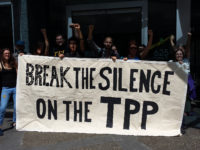The NAFTA negotiations resume in Montreal this week with Internet liability emerging as an increasingly contentious issue. I was pleased to be part of a group of 55 Internet law experts and organizations that recently urged negotiators to include Internet safe harbour rules that promote freedom of expression in the agreement. The provision, which is already found in U.S. law, would lower barriers to startup online companies, advance free speech, and protect sites publishing consumer reviews.
Latest Posts
When Consultations Count: Why the TPP is a Reminder of the Value of Speaking Out
In June 2016, I appeared at one of the government’s public town hall meetings on the TPP. Alongside then-International Trade Minister Chrystia Freeland (now Global Affairs minister), C.D. Howe’s Daniel Schwanen, and Unifor’s Jerry Dias, I had the chance to raise concerns with the TPP’s IP and e-commerce provisions and then hear from dozens of people who raised a wide range of issues. The town hall was part of a broad public consultation that was frequently derided by critics as a stalling tactic, yet the impact of the consultation was felt with yesterday’s announcement of a deal on a slightly re-worked TPP that includes suspension of many of the most controversial IP provisions.
Canada Successfully Stands Up For Balanced IP and Canadian Culture in TPP Deal
While the NAFTA negotiations in Montreal were expected to be the lead trade story this week, the Trans Pacific Partnership talks in Tokyo have stolen the show with the remaining 11 countries reaching agreement on a deal that is likely to be signed in March. Canada faced intense criticism last year from some TPP partners (particularly Japan and Australia) over its demands to address concerns with the agreement. That sparked some Canadian business groups to quickly call on the government to simply cave in order to conclude a deal. Global Affairs Minister Chrystia Freeland and International Trade Minister François-Philippe Champagne rightly argued that capitulation is not a negotiating strategy and they now come away with an improved (albeit still flawed) agreement.
Insider Access: Secret Advisory Groups Damage the Credibility of Canada’s NAFTA Negotiations
The Canadian government has frequently touted its commitment to transparency and consultation with respect to its trade negotiations, citing a steady stream of open events and its receptiveness to public feedback. Indeed, since the renegotiation of NAFTA was placed back on the table, officials say they have talked to nearly […]
Broadcast Dialogue – The Podcast: An Interview with Dr. Michael Geist
I appeared on the Broadcast Dialogue – The Podcast, hosted by Shawn Smith on January 4, 2018.
In the episode, we discussed copyright reform, net neutrality, and what we can expect from CRTC in 2018.











